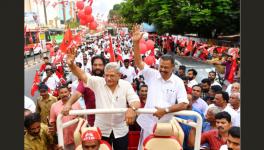AIMIM and India’s Majoritarian Impasse
The strategy of fielding candidates in local and state elections employed by Asaduddin Owaisi, chief of the All India Majlis-e-Ittehadul Muslimeen political party, has foregrounded the intricate majoritarian impasse that bedevils India. Notwithstanding his stated intention to expand the political representation of Muslims, the outcome of his approach seems to be electoral benefits for the Bharatiya Janata Party, for it divides the voters along religious identity. At the heart of the complexity is whether or not Muslims voting for the AIMIM is a necessarily communal phenomenon. At the other end of this spectrum is the question of how to be a Hindu without supporting majoritarianism.
Owaisi’s strategy is based on the legitimate anger of a section of Muslims towards the so-called secular parties, which have done less than expected for the community. Despite neglecting the interests of minorities, the BJP’s propaganda machine has instilled among its majority-community voters that such parties engage in “minority appeasement”. It is therefore legitimate for Owaisi to ask why he should not expand the political representation of Muslims. And it is also legitimate for Muslims, for instance in West Bengal, to ask why, if regional parties are not doing enough for them, they still cannot vote for the AIMIM. According to them, if Owaisi’s party performs well in elections, it gives them a political presence, which is especially favourable if they do not vote for his candidates out of communal prejudice against Hindus.
Further, Owaisi and Muslim voters can argue that the BJP has been expanding its footprint in many regions, including the 18 seats it won in the last general election in West Bengal, even though AIMIM had not fielded a single candidate in the state. If the BJP is winning anyway, due to the consolidation of Hindu voters around its candidates, how valid is it to then accuse Owaisi of helping the BJP chalk its growth?
Hence, the majoritarian impasse seems to cut both ways: if Muslims vote for AIMIM, it justifies to the Hindus their decision to vote for the BJP. At the same time, if Muslims continue to vote for other regional outfits or the Congress, then they will not get the benefits and protection they deserve as these parties are wary of being accused of minority appeasement. So, Owaisi has taken the line of argument that he is committed to expand the presence and representation of Muslims, irrespective of the effect it has on other parties.
Further, Muslims harbour the grouse that secular parties such as the Trinamool Congress never encouraged independent Muslim voices within the party, but gave space only to yes-men. In West Bengal, it is clear that Muslims are angry with the Trinamool for short-changing them and taking their votes for granted, while Hindus are angry with Didi too, for her “minority appeasement”. In this context, Muslims are caught in a bind: either be taken for granted by parties that cite the threat of an expanding BJP or vote for Owaisi, which only consolidates the Hindu vote further. For even Hindus would point to the argument that if Muslims can vote for AIMIM, why should their voting for the BJP be characterised as communal. In this conundrum, the point that Muslims have and do vote for non-Muslim parties gets waylaid. Besides, Hindus could legitimately counter that they, too, vote for non-BJP parties.
While voting for AIMIM expresses the legitimate indignation of Muslims against secular parties, and is not necessarily communal voting, yet in the same breath, Owaisi’s overtures do help the BJP. Therefore, it is untenable for him to claim he is unconcerned with what party finally wins so long as his vote-shares and seat-counts increase. It could also be argued that the AIMIM looks sectarian because Hindus would not vote for a party that is committed to uniting Muslim. The question could also be asked why only Owaisi is seen as a “vote-cutter” and not the other parties.
In other words, Muslims could well wonder why secular parties have not come together to defeat the BJP and why doing so is seen as a concern of only the Muslims and AIMIM? After all, the BJP’s majoritarianism has had adverse consequences for many sections of Hindus and not just the minorities. For instance, if the Congress and the Left do not invest in the bigger picture, can a small-time party with a limited footprint be blamed for BJP’s rise in West Bengal? Or, even if it wills, can AIMIM make a difference to the current majoritarian impasse?
At another level, all these questions, if pointed at AIMIM, can raise doubts about its desirability as a political alternative. Does Owaisi himself allow independent Muslim voices and leaders within the AIMIM? What is the track-record of the AIMIM in bringing about positive changes in the lives of Muslims in Hyderabad, leave alone Telangana? How much have Muslims really benefited in terms of education, health facilities and employment due to the efforts of Owaisi? What if one argues that Muslims would not benefit in terms of social policy even with the rise of the AIMIM. This is both because of the nature of politics and rhetoric that AIMIM pursues and because it is too small an outfit to pursue an independent policy that can substantively impact Muslim welfare. Would this not justify a strategy to mount more pressure on secular parties from within rather than voting for the AIMIM, given that its few MLAs or MPs can make no perceptible difference, while the cost of its success could be further consolidation of the BJP?
The conundrum seems to be that majoritarianism is consolidating irrespective of the AIMIM and Owaisi’s strategy to contest “against”—or independent of—secular parties, even while it is fortifying the process of consolidation. One might ask what else Muslims and Owaisi can do, while also finding fault with his argument that who wins is not of his immediate concern. What will it take to overcome this majoritarian impasse is a question not many have the answer for, and its impact can well be felt in West Bengal and other elections?
The author is associate professor, Centre for Political Studies, JNU. The views are personal.
Get the latest reports & analysis with people's perspective on Protests, movements & deep analytical videos, discussions of the current affairs in your Telegram app. Subscribe to NewsClick's Telegram channel & get Real-Time updates on stories, as they get published on our website.
























